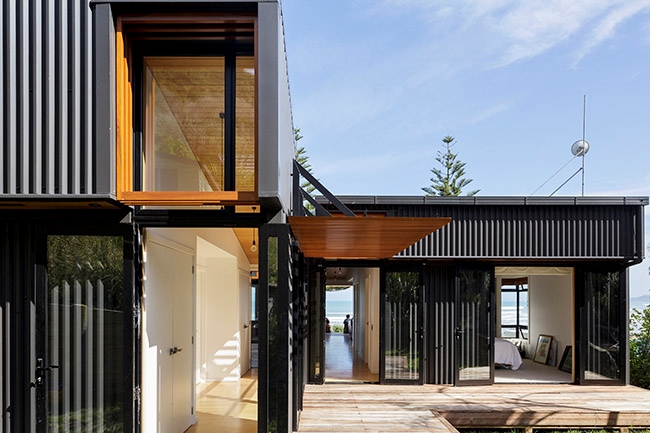
FAYETTEVILLE, Ark. – Jeremy Smith will present a lecture at 4 p.m. Monday, Feb. 11, in Ken and Linda Sue Shollmier Hall, Room 250 of Vol Walker Hall, on the University of Arkansas campus, as part of the Fay Jones School of Architecture and Design lecture series.
Smith, ANZIA, is the design director at Irving Smith Architects, a research-based design practice in Nelson, New Zealand, that focuses on working in sensitive environments in New Zealand and abroad.
In his lecture, "Soft Architecture; Is Being Finished Finished?" he'll discuss how he embarked on an alteration, research and teaching adventure after a cyclone cleared the trees around a house located in a forest. His firm repaired and updated the house in anticipation of the site's shifting landscape. Since then, he has developed and shared the idea of "soft architecture," or participating with existing landscapes before generating new contexts.
The relationship of New Zealand architecture to landscape follows the successional theories brought by both Polynesians and Europeans, who, rather than inhabiting the forest, first cut and then built inside clearings and formed new landscapes. But deforestation often failed, and Smith has examined the landscapes in which clearings were not controlled and are returning to the wild. With New Zealand so recently inhabited, these failed, and "unfinished" landscapes can ultimately regress from a clearing to a near-original forest.
Smith suggests that humans cannot both continue building in clearings and allow a near-original forest to grow, not if they want to maintain a fit between architecture and landscape. In these shifting landscapes, Smith argues, people need to change the approach from repeatedly finishing the landscape to iteratively finishing buildings. He contends that if people stop mowing the lawn around New Zealand architecture, buildings must become soft; being finished is finished.
Smith led a range of Irving Smith Architects' design innovations, including winning World Villa of the Year at the World Architecture Festival in Berlin 2017. The firm's offSET Shed House was a finalist at the World Architecture Festival in Singapore 2015, and the firm's Trafalgar Centre Reinhabitation project received an honorable mention at the 2018 Architecture Masterprize Awards and a bronze ranking at the 2017 International Design Awards.
Smith's practice has received multiple New Zealand Architecture Awards in public and residential categories, including two awards in 2018. The firm has been a finalist for the highest architecture award in the country, the New Zealand Architecture Medal, and it was twice awarded New Zealand's national timber design award.
His firm's design work has been featured recently in publications such as Architecture Record, Elle, Vogue and GQ magazines. Smith has lectured widely about the practice's work, and he has represented New Zealand at the 2018 and 2015 Prague International Architecture Festivals with a series of exhibitions developing the idea of soft architecture.
He has been a judge for NZIA New Zealand Architecture Awards, as well as at the World Architecture Festivals in Singapore, Berlin and Amsterdam. He teaches an iterative design studio at the University of Auckland, and he has won Victoria University of Wellington's Centennial Medal for post-graduate academic achievement. He also pursued a design-based doctoral degree, undertaking it between practice commitments. Smith's return to academia has allowed him to merge what are often divergent disciplines in New Zealand architecture.
The school is pursuing continuing education credits for this lecture through the American Society of Landscape Architects and the American Institute of Architects.
The public is invited to attend. Admission is free, with limited seating.
For more information, contact 479-575-4704 or fayjones.uark.edu.
Topics
Contacts
Shawnya Lee Meyers, digital media specialist
Fay Jones School of Architecture and Design
479-575-4744,
Michelle Parks, director of communications
Fay Jones School of Architecture and Design
479-575-4704,